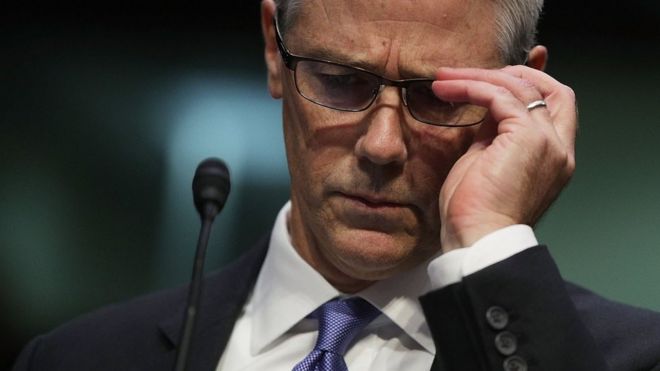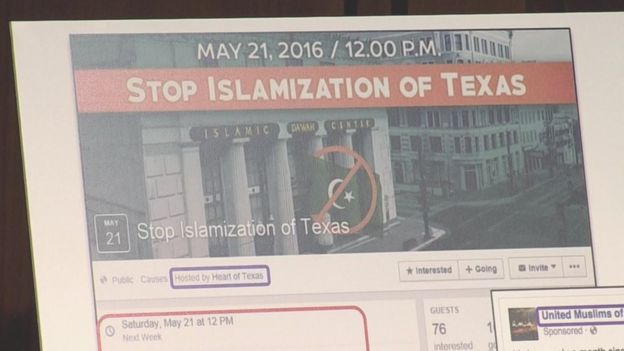 |
| Facebook's lead counsel Colin Stretch said the company was pained to learn it was being abused to provoke American discontent |
Russian operatives, likely working from St Petersburg, provoked angry Americans to take to the streets, a US Senate committee heard on Wednesday.
The May 2016 protest, arranged by a group named Heart of Texas, was one example of Kremlin-backed efforts to destabilise the American electoral process.
Lawyers for three technology companies - Facebook, Twitter and Google - were told they were grossly underestimating the scale of the problem.
"You just don't get it," said California Senator Dianne Feinstein.
"What we’re talking about is a cataclysmic change. What we’re talking about is the beginning of cyber-warfare."
She added: "We are not going to go away, gentlemen. This is a very big deal."
In the streets
Facebook said earlier this week that as many as 126 million people might have been reached by Russian propaganda efforts, a combination of paid advertisements and so-called "organic" posts that spread naturally as other users share the content.
It added on Wednesday that an additional 16 million users could have been reached via photo-sharing app Instagram, which the company also owns.
It was organic posts that were under the most scrutiny from the Senate Intelligence Committee on Wednesday.
Senator Mark Warner, the committee's deputy chairman, discussed how the Russian-made Heart of Texas group amassed 250,000 followers.
 |
| The Heart of Texas group was managed by Russian operatives based in St Petersburg, Facebook believes |
The group then created an event to be held at an Islamic culture centre in Houston. The event was titled "Stop Islamization of Texas".
The protest duly took place, as did a counter-protest. Local media at the time reported that the organisers "could not be found" at the event.
Facebook to share Russia-linked political adverts with investigators
Facebook uncovers Russia-funded misinformation campaign
Another example shared on Wednesday showed an account sharing "benign" posts on Christianity later shifting to anti-Hillary Clinton posts after the group had reached a critical mass of users.
Twitter, too, faced criticism for potentially under-reporting the extent of automated bots on its network.
The firm's lawyer Sean Edgett said Twitter's own research suggested that less than 5% of its 330 million users were bots. Senator Warner, however, said independent research suggested the number was perhaps as high as 12-15%.
Fake news
The companies, speaking individually but agreeing on every issue, said they were "deeply concerned" that they had become the leading platforms for "fake news" on the internet.
"We cannot defeat this evolving shared threat alone," Facebook's top lawyer Colin Stretch said.
However, none of the firms would commit to backing the Honest Ads Act, which would regulate online advertising, focusing on greater transparency around political advertising.
Twitter's Mr Edgett said the companies wanted some "fine-tuning" to the proposals but supported its goals.
Several senators suggested that more hearings and consultation would be needed, expressing their frustration that the companies were not being represented by higher-ranking executives.
"I'm disappointed that you're here, and not your CEOs," said independent senator Angus King.
"If we go through this exercise again we should appreciate seeing the top people."
"I wish your CEOs were here," concurred Democrat senator Joe Manchin.
"They have to answer to this."
Source: BBCNews
